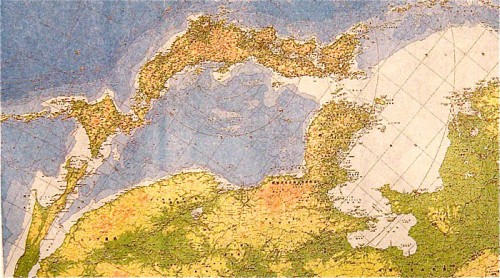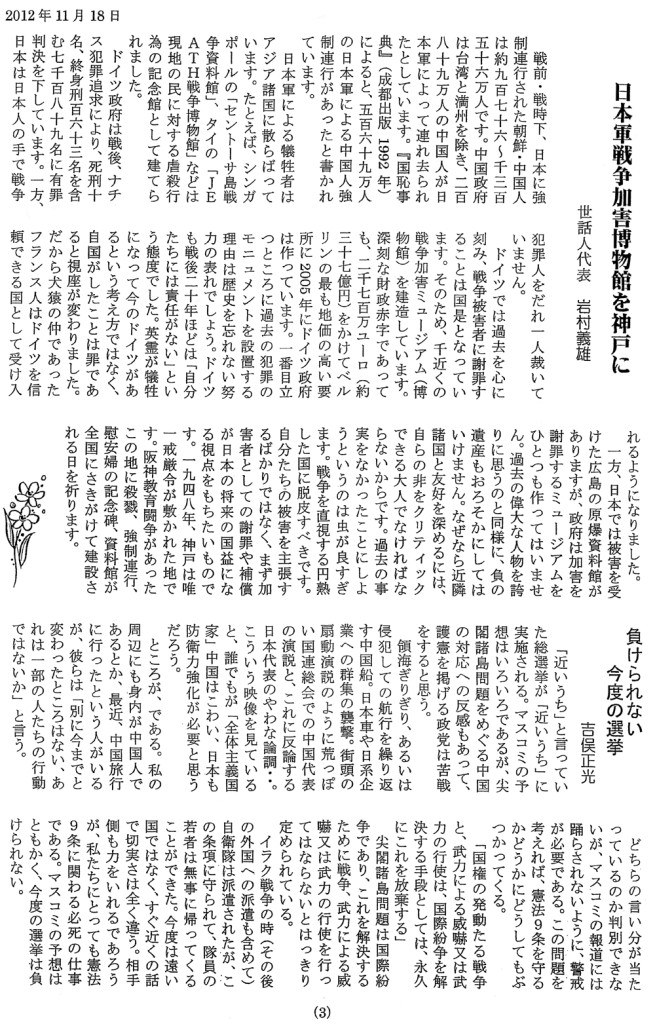
消してはならない! 加害の歴史
過去に目を閉ざそうとする人間は,過酷な過去をもう一度経験するように強制される (元西ドイツ大統領ヴァイツゼッカー)
日本では被害を受けた広島の原爆資料館がある。一方,政府は戦争加害を謝罪するミュージアムをひとつも作ってはいない。過去の偉大な人物を誇りに思うのと同様に,負の遺産もおろそかにしてはいけない。隣国との友好にはドイツの千近くの加害博物館を見倣うべきだろう。
ドイツでは過去を心に刻み,戦争被害者に謝罪することは国是となっている。そのため,千近くの戦争加害ミュージアム(博物館)を建造。そのおかげで,犬猿の仲であったフランス人はドイツを信頼できる国として受け入れるようになっている。
戦争資料館設立 趣意書
青地はクリックしてください。
なぜ今,神戸に戦争加害博物館が必要なのか。2012年に,神戸に戦争加害博物館を作ろうと運動を始めた目的は何か。
戦争加害の事実を丹念に拾い上げたい。知性面の分析だけに終わってもならない。「リアル」に戦争を実証的に見つめ直す契機が必要である。なぜならば実際に日本軍がアジア周辺諸国に「侵略戦争」を行っていながら,戦後,政治家が「まぼろし」「偽り」「でっちあげ」と強弁しているからである。自国内はもとより国際的に「自存自衛」の戦争であったと日本政府は主張している。大虐殺,強制連行,慰安婦が存在しなかったかのように多くの日本人はいつしか無関心,忘却,風化の傾向を否めない。学校で学ぶ教科書からも削除され,戦争の歴史を真正面からとりあげていない。
戦争当時の現実を体験していないばかり,学んでいない21世紀の人々が,歴史文献を何冊読んでも実感できない問題がある。戦争に再び駆り出される社会に抗う心が育てられていない。戦場で雨あられの爆撃も経験していなければ,1937年12月1日から行なった日本軍による南京大虐殺を目撃証人でもない。朝鮮半島や中国,東南アジアなどで慰安婦を強制連行した現場をも知らない。
戦前,戦時下に日本軍が残虐な行為をしたと言うやいなや,自虐史観 masochistie view of history というオウムが反応するような空気が日本列島を覆っている。
しかし,731部隊が行なった人体実験,中国の撫順での住民虐殺,沖縄におけるジェノサイド[集団殺害]は決してねつ造したものではない。
忘れてはならない歴史を資料館が覚醒させるだけが目的ではない。日本軍兵士が行なった真実から繰り返してはならない歴史について学習することが本来であろう。
たとえば,シンガポールの「セントーサ島戦争資料館」,タイの「JEATH戦争博物館」などは日本軍が現地の民に対する虐殺行為の記念館として建てられた。
ドイツ政府は戦後,ナチス犯罪追求により,死刑10名,終身刑163名を含む7189名に有罪判決を下している。一方,日本は日本人の手で戦争犯罪人をだれ一人として裁いていない。
ドイツでは過去を心に刻み,戦争被害者に謝罪することは国是となっている。しかし,戦後すぐはドイツでも加害責任を認めたくない保守的な意見が覆っていた。1939年以降,ヒトラー扇動による戦争は第一の罪,一方,戦後,加害者としての罪に真剣に立ち向かわないことを第二の罪とドイツの民,政治家,メディアはとらえるようになった。その結果,1000近くの戦争加害ミュージアム(博物館)を建造。国が財政赤字にあがいていようがいまいが,博物館構想は頓挫しなかった。たとえば,2005年,ベルリンの最も立地条件のよい場所に,ドイツ政府は2700万ユーロ(約37億円)の建設費を承認した。
神戸は戦後3年を経た1948年に,唯一,戒厳令が敷かれた場所である。戦争当事国が攻略した国,地域の言語を奪うことは常套手段である。言語中枢の支配こそマインドコントロールの手法である。戦後になっても朝鮮語で学ぶ機会を与えないために朝鮮学校を排除しようと発砲した<参照>神戸事件[通称「阪神教育闘争」(1948年4月24日)]があった。母語による学校許可を願い出た<参照>朴柱範[パク・チュボム 1885-1949]は志半ばで倒れる。
過去の犯罪のモニュメントを設置する理由は歴史を繰り返さない証明である。ドイツも戦後20年近くは「自分たちには責任がない」がまかり通っていた。英霊の犠牲のおかげで国家が救われたという視点から,自国がしたことは罪であると素直に受け入れる否定の論理にシフトした。だから戦時下蹂躙された隣国フランス人は敵国ドイツを信頼できる国として認めることができたのである。
日本では広島の原爆資料館など「被害」を被った立派な施設がある。一方,「加害」について日本政府は語ろうとしないし,海外では反省の弁を臭わすが,謝罪もしない。それでは次代を担う若者たちはまったく無知な裸の王様であろう。過去の歴史で登場する英雄たちを誇りに思うのと同様に,負の遺産もおろそかにしてはなるまい。
未来志向で近隣諸国と友好を深めるため,自らの非を反省,謝罪,補償できる大人でなければならない。過去の事実をなかったことにしようというのでは虫が良すぎる。戦争を直視する円熟した国に脱皮すべきであろう。たとえ世界的に民主主義が後退しても,国が道を踏み外すことがあっても,平和を守ろうとする信念を捨象してはいけない。自分たちの被害を主張するのではなく,まず加害者としての謝罪や補償が日本の将来の国益になるという展望を日本人全体が共有することが前提である。そのためにも戦争資料館は戦争突入への抑止力,平和発信基地,教育に有益であろう。過去の資料を封印されてしまった日本人が戦争資料館によって,記憶の倉庫に保存しておくべき史実をよみがえらさせる契機となろう。Rememory をいつまでも噛みしめ,次世代が継承視点をもってほしい。いわば記憶運動である。
普遍的に民族,思想,宗教に関係なく,多くの人々が受け入れやすい共通認識は「平和」である。神戸に殺戮,強制連行,慰安婦の資料などが全国にさきがけて建設される日を祈る。
2016年10月30日
設立発起人 岩村義雄 Pastor Yoshio Iwamura
Intention of Setup of the War Archive Museum
Why do we need a museum of war crime in Kobe now? What was the purpose of starting the campaign to establish the war crime museum in Kobe in 2012?
We would like to carefully pick up the facts of war inceptor / perpetrator / victimizer. We should not end only with the intelligent analysis. We need an opportunity to reconsider the war empirically in “real”. It is because politicians are insisting obstinately as “phantom”, “lying” or “made-up” after the war, even though the Japanese army definitely conducted “war of aggression” to the countries around Asia. The post-war Japanese government insists not only domestically but also internationally that it was the war of “self-existence and self-defense”. We cannot deny that a lot of Japanese have a tendency of indifference, oblivion and fading as if nothing like mass massacres, forced labors and comfort women exist. Those facts are removed from school textbooks, and the history of war is not mentioned directly.
There are problems that Japanese people in the 21st century cannot think realistically even through reading historical documents, because not only they never experienced the reality of the war-time, but also they haven’t learnt about it. People are not able to grow their mind to against the society that would be driven back to the war again. Contemporary Japanese people neither experienced a bombing like a rain on the battlefield nor became a witness of the Nanjing Massacre by the Japanese armies from December 1, 1937. They even do not know the scenes that comfort women were forcibly taken away from the Korean Peninsula, China and Southeast Asian countries.
Immediately after receiving the opinion that Japanese army conducted brutal actions before and during the war-time, the climate of “masochistic view of history” instantly, like a parrot, covers the entire Japan.
However, the lethal human experimentation carried out by the Unit 731 (Under General Ishii’s supervision. Chemical and biological weapons towards Chinese civil people), the massacre of residents in Fushun at Liaoning Province of China and the genocide (group mass killing) of local people in Okinawa, are not a fabricated history at any means.
https://en.wikipedia.org/wiki/Unit_731 https://zh.wikipedia.org/wiki/731%E9%83%A8%E9%98%9F
The awakening the history that should not be forgotten is not only the purpose of the museum. Learning about the history from the real fact, which were done by Japanese soldiers that should not be repeated, is the primary purpose.
For example, “Fort Siloso, Sentosa Island War Museum” in Singapore and “JEATH War Museum (พิพิธภัณฑ์อักษะเชลยศึก)” IN Thailand were established in the momory of the atrocities that Japanese armies conducted to the local residents or allied prisoners of the war.
https://discoversg.com/2016/02/15/5-war-museums-in-singapore/ https://en.wikipedia.org/wiki/JEATH_War_Museum
After the war, the German government convicted 7189 people, including 10 death sentences and 163 life sentences by pursuit of the Nazi war crime.
On the other hand, Japan has not been judged any war criminals by Japanese on own.
Apologizing to the war victims is a national policy of Germany to keep the past crimes. However, in the immediate after the war, conservative opinions that did not want to acknowledge their perpetration responsibility covered even in Germany. German citizens, politicians and medias came to think that the war by Hitler’s instigation after the 1939 is the first crime, while at the same time, the attitude that to do not think seriously about the crimes as the perpetrator after the war is the second crime. As a result, they built nearly 1000 war crime museums. Whether the country was facing difficulties to budget deficits, the plan of museum was never stopped. For example, in 2005, the German government approved a construction fee of 27 million euros (about 3.7 billion yen) with the best location in Berlin.
Kobe is the only place where the martial law was executed in 1948, three years after the war. It is a routine practice for the war actor to deprive the language of the country or region where they occupied. Domination of the language center is the method of mind-control. There was a Kobe Gun Shooting Incident (commonly known as “Hanshin Educational Struggle”. April 24, 1948), which threaten the Korean school (or Joseon Hakkyo) to eliminate the opportunity to study in Korean language even after the war. Pak Jubeom (1885-1949) who requested a permission of school education by using mother language Korean, died without fulfilling his life ambition.
The reason for setting monument of crime in the past is the prof that we will never repeat the same history. In Germany as well, nearly 20 years after the war, the thought of “we are not responsible for anything” was common. From the viewpoint that the country was saved thankfully by the sacrifices of the spirits of the war dead, they shifted to the logic of opposite denial of accepting what they did as a sin obediently. Therefore, the neighboring country France, which was trampled and occupied during the war time, was able to acknowledge a former enemy Germany as a trustworthy state again.
In Japan, there are excellent facilities that were “damaged”, such as Hiroshima Peace Memorial Museum. On the other hand, the Japanese government does not talk about “crimes”, and even they show attitude of reflection in overseas, but never apologize. Then such attitude makes the young people who will be responsible for the next generation will be an absolutely ignorant Emperor’s New Clothes. Just like being proud of the heroes who appeared in the past history, we should not neglect our negative legacy in the past.
In order to deepen friendship with neighboring countries with a future-oriented approach, young people must be adults who can reflect their sin on their own, apologize and compensate. It is too selfish to try making own past never be existed. We should cast off to be a mature country that looks directly about the war. Even if democracies hold back globally, even though the country may step out form the road, we must not abandon the belief to preserve peace. Rather than making an assertion of own damages, it is a premise that the whole Japanese share a perspectives that apologies and compensation as the perpetrators will brings future national interests to Japan. For that purpose, the war museum will be beneficial for deterrence of outbreak the war, being a facility of peace message and education. I will be a chance for Japanese people, who has been sealed their past documents and materials, to revive the historical facts that should be preserved in the memory storage of Japanese people by this war museum. I hope the next generation to have a perspective of inheritance to remember “memory from the past”. It is, so to say, a memory movement.
Peace is a common concept that universally easy for many people to accept regardless of ethnics, philosophies or religions.
I wish the day will come that the facility with archives of massacres, forced labors and comfort women will be established ahead of other Japanese cities.
Date: October 30, 2016
Yoshio IWAMURA Promoting founder
Date: October 30, 2016
_________________________
Yoshio IWAMURA
Promoting founder
